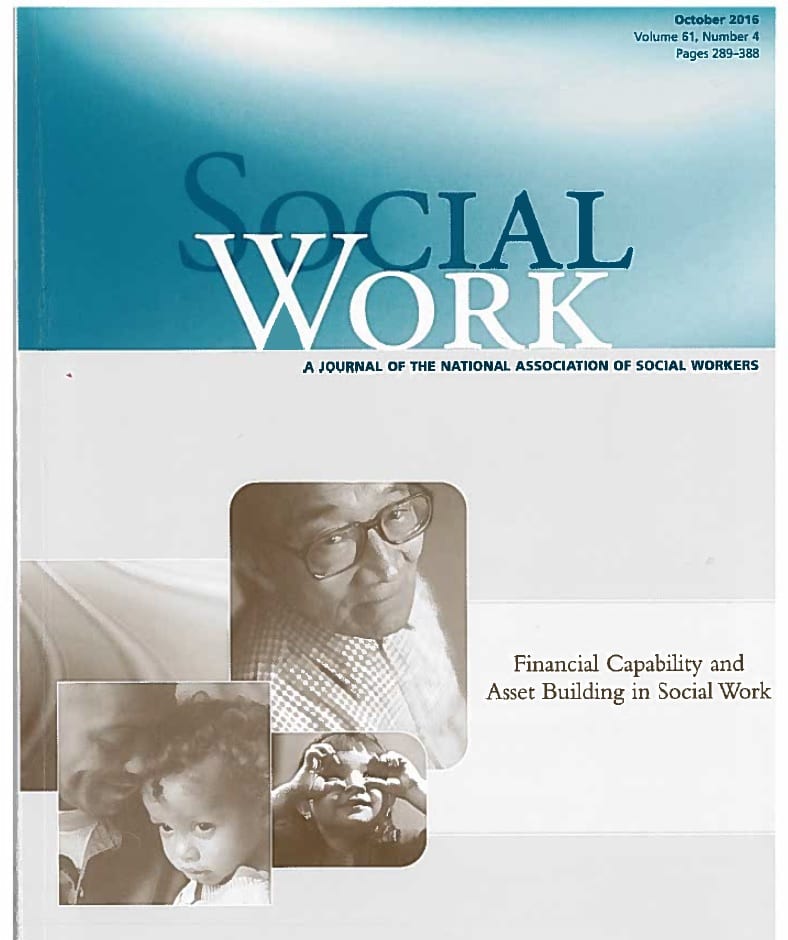Recent proposals to change the scope of federal consumer protections bring to the fore a broader discussion about financial inclusion. Now three leading journals are heightening awareness of a national effort to reintroduce to social work a curriculum focused on building financial capability for all Americans: Social Work, Journal of Social Work Education and Journal of Community Practice have published substantial articles about Financial Capability and Asset Building (FCAB).
“We’re excited to see the good work of so many of our research colleagues reach social work practitioners, educators, students, policymakers and others,” said Margaret S. Sherraden, faculty director of the FCAB initiative at the Center for Social Development (CSD) at Washington University in St. Louis’ Brown School.
“Bridging financial inclusion and social work will allow the profession to improve people’s overall well-being,” said Gena McClendon, FCAB project director at CSD. In 2016, “Build financial capability and assets for all” was introduced as one of the 12 Grand Challenges for Social Work, an initiative of the American Academy of Social Work & Social Welfare.
The original versions of many of the articles were presented during the 2015 Financial Capability and Asset Building Convening hosted by CSD and the Financial Social Work Initiative at the University of Maryland School of Social Work, with support from Wells Fargo Advisors, The Arthur Vining Davis Foundation and The Woodside Foundation.
“It is wonderful to see the products of these important studies in leading social work journals, as they help to pave the way in defining social work’s unique contributions to research, practice and education in the FCAB field,” said Jodi Jacobson Frey, associate professor and chair of the Financial Social Work Initiative at the University of Maryland School of Social Work.
Social Work
The 60th anniversary issue of Social Work, the flagship journal for the National Association of Social Workers, opens with the editorial “Celebrating Six Decades of Social Work and Advancing Financial Capability and Asset Development.”
“Why FCAB in social work?” write Tricia B. Bent-Goodley, Sherraden, Frey, Julie Birkenmaier, Christine Callahan and McClendon.
“The simple reason is that financial troubles often underlie the issues that bring people into care, counseling, clinics, courts, and shelters. Finances and economics are fundamental to social justice and human rights and to the welfare of individuals, families, communities, and society as a whole. The articles highlighted in this 60th anniversary issue of Social Work suggest that FCAB should assume a more prominent place in the profession.”
The issue features seven articles about financial capability and asset building, beginning with “Financial Capability in Early Social Work Practice: Lessons for Today,” in which Paul H. Stuart, director of the School of Social Work at Florida International University, says helping clients improve their financial situation was an important part of social work practice for much of the profession’s first half-century. “As social workers consider ways to work with clients to improve their FC [Financial Capability] today, they may want to consider how social workers tried to improve client FC in the profession’s early years.”
‘Resurgence in interest’
A special section on financial capability and asset building, with six articles about social work education and training, is included in the Journal of Social Work Education (Volume 53).
“Recently, social work has seen a resurgence in interest in improving financial stability and security among individuals, families, and communities,” the authors write in “Financial Capability and Asset Building in Social Work Education.”
“Partially in response to the latest U.S. economic recession and slow economic recovery, national attention is now focused on individual and family financial instability and economic inequality, with particular attention to the increasing racial wealth divide.”
A special issue of the Journal of Community Practice kicks off with “Financial Capability and Asset Building: Building Evidence for Community Practice,” an introduction by the guest editors. The six articles that follow address the financial capability of incarcerated women, Latinos, older Asian immigrants and migrant Chinese workers.
“Each underscores the importance of culturally relevant research and practice in FCAB work,” write guest editors Birkenmaier, Sherraden, Frey, Callahan and Anna Maria Santiago.
“Instead of employing a one-size-fits-all strategy, interventions and measurement of financial education and capability concepts must respond to the needs and circumstances of specific subpopulations.”
